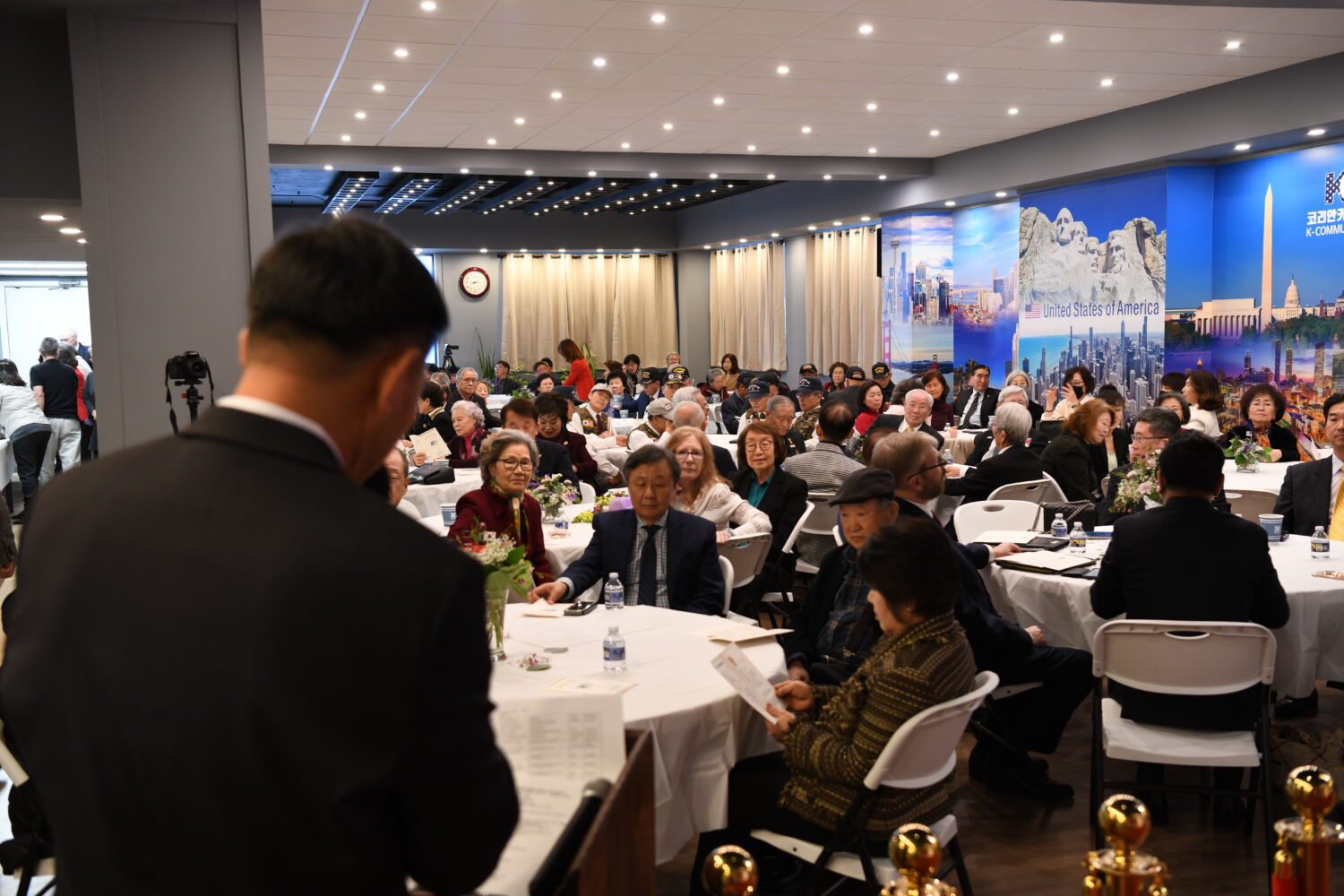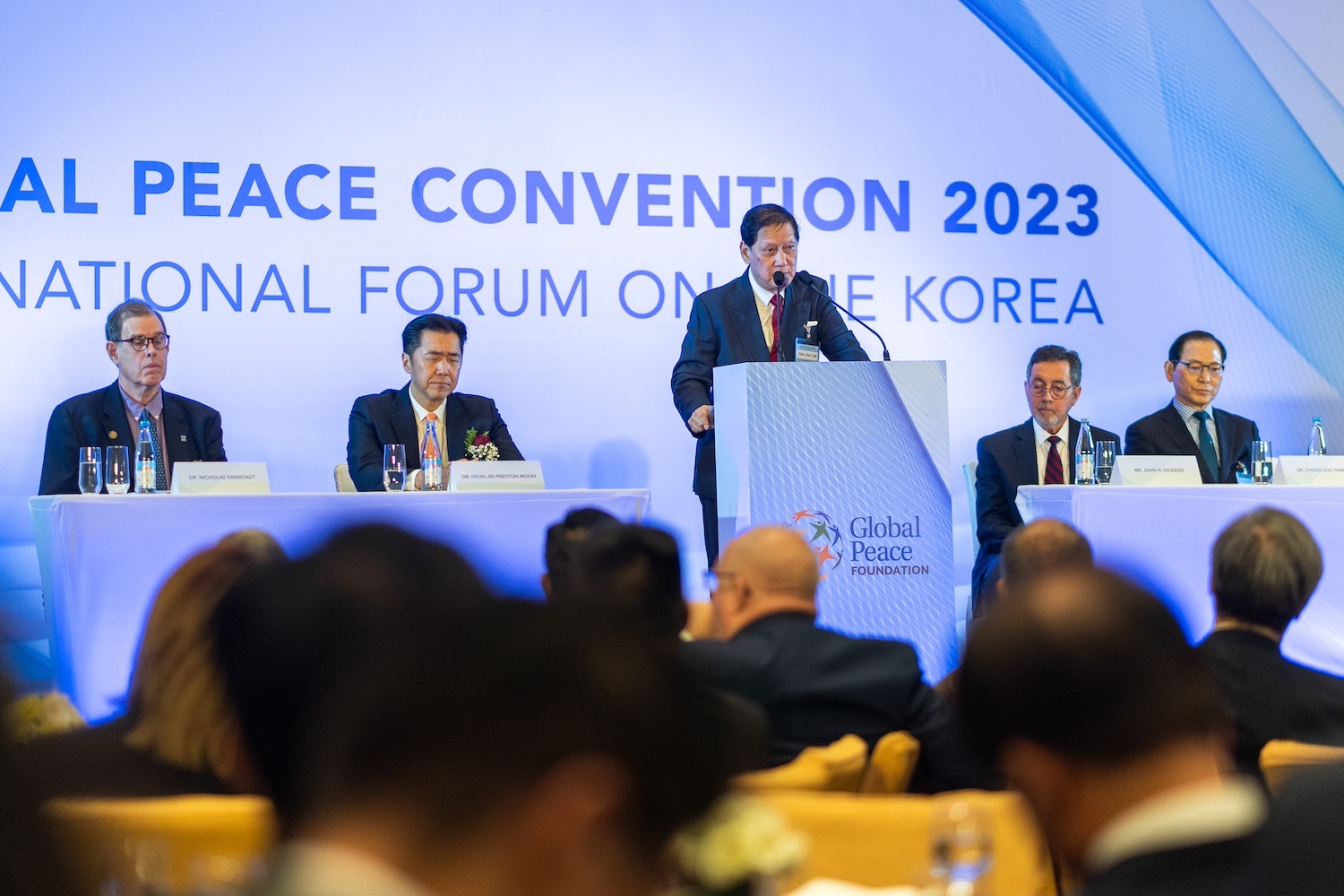Human rights experts from the United States, South Korea, and Japan and prominent escapees from North Korea brought focus to ongoing human rights abuses in the DPRK at a forum in Seoul on September 23. The forum marked the seventy-fifth anniversary of UN’s Universal Declaration of Human Rights and the twentieth anniversary of North Korea Freedom Week.
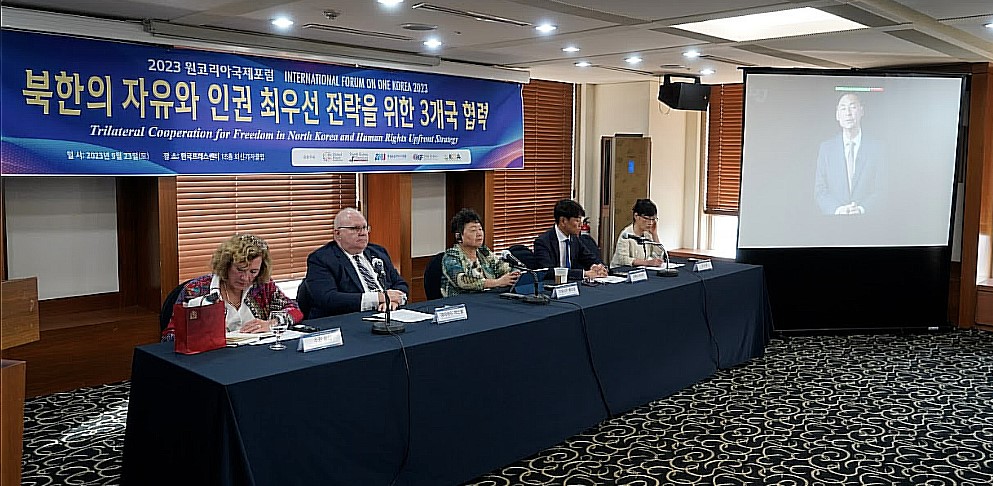
Panelists Suzanne Scholte, Col. David Maxwell, Eiko Kawasaki, Masaki Ikeda, and Sora Lee listen to a video message presented by former U.S. State Department Ambassador-at-Large for Global Criminal Justice Morse Tan. The panelists presented evidence of North Korean human rights abuses.
The latest convening of the International Forum on One Korea, “Trilateral Cooperation for Freedom in North Korea and Human Rights Upfront Strategy,” urged greater cooperation among the U.S., Japan, and the ROK to build global consensus for a human rights upfront strategy—targeting the “Achilles heel” of the Kim regime. Panelists urged governments and civil society watchdogs to pressure the DPRK to follow international human rights protocols and, ultimately, to advance the process of a free and unified Korea.
The forum was co-convened by the Global Peace Foundation, North Korea Freedom Coalition, Action for Korea United, One Korea Foundation, and Korea of All.
In opening remarks, former U.S. State Department Ambassador-at-Large for Global Criminal Justice Morse Tan cited the landmark 2014 UN Report of the Commission of Inquiry on Human Rights in the Democratic People’s Republic of Korea as the most authoritative documentation of the extreme human rights violations and crimes against humanity committed by the Kim regime. The people in North Korean are “living in a state of rightlessness, victims of a criminal cult,” the ambassador said, and are “crying out for justice and accountability.”
Noting the lack of international action ten years after the Commission of Inquiry report was issued, Ambassador Jung-Hoon Lee, Chair of Committee for Planning Future Unification, called for concrete steps to compel change in the DPRK. He said that President Moon failed to raise the issue of human rights in three summits with the North Korean leader. Thus, the Yoon administration should establish a commission similar to the bipartisan U.S. Commission on Human Rights in China, and a Database Center for North Korean Human Rights that would not only record the crimes against humanity committed by the Kim regime, but bring formal charges based on South Korean law.
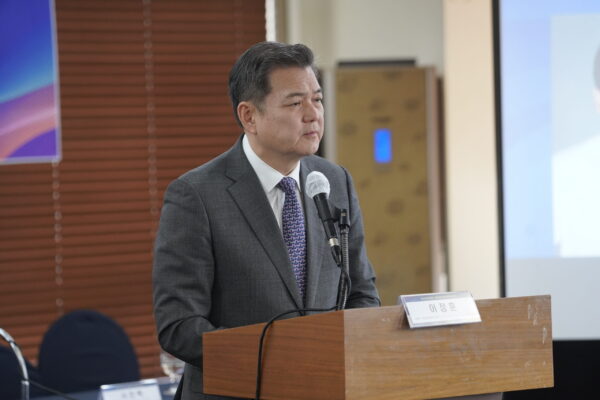
Ambassador Jung-Hoon Lee addresses the forum.
Sending information to the North Korean people, a policy also ended by the Moon government, should be robustly implemented as a component of psychological warfare to pressure the Kim regime. Finally, the ambassador said, governments should pressure the UN High Commissioner for Refugees to protect North Korea escapees in China and support a U.S.-ROK-Japan Action plan to sanction the North Korean government.
Refugee repatriation
North Korea Freedom Coalition Chair Suzanne Scholte said the dangers facing Korea’s democracy are increasing as Kim Jong Un works with other repressive regimes to accomplish his goal of unification of the Korean peninsula under his family dictatorship. She said North Korean refugees who have fled to China are especially at risk if repatriated.
“The UN, the United States, Japan, and the Republic of Korea should announce that they will sanction any Chinese official known to be involved in the forceful repatriation of any North Korean as they are complicit in murder,” Scholte said.
“This is the time to initiate a new strategy. It should be based on three lines of effort: a human rights upfront approach, a comprehensive information and influence campaign, and the pursuit of a free and unified Korea.”
“We need to communicate to the people living in the north that they have allies in South Korea, Japan, and the United States and increase the flow of information to North Korea by land, by sea, and by air.”
Lim Cheol, a North Korean escapee and attorney at the Seoul National University Public Interest Law Center, said North Korean defectors in China do not receive any legal protection and are treated as criminals. In addition, the activities of religious and civic groups helping North Korean defectors are viewed as illegal.
“What is important is that a North Korean citizen crossed the border and fled to China is itself a violation of North Korean criminal law,” Lim said. “Life-long correctional labor punishment or even the death penalty may be imposed. What is important in refugee recognition is not the reason for leaving the country of nationality, but the reason for not being able to return.”
Lim said the Chinese Constitution legally protects the rights and interests of foreigners and those who request refuge for political reasons. It stipulates the right of foreigners to be protected (Article 32, Paragraph 1). However, foreign experts say that China is violating international treaties and customary international law, and that China is especially targeting North Korean defectors.
Human rights and nuclearization
Turning to the growing nuclear threat posed by the North Korean regime, Col. David Maxwell, a Senior Fellow of Global Peace Foundation, said that “perhaps counterintuitively it is the focus on human rights that must lead to unification and only when unification is achieved there can be denuclearization. Human rights are a moral imperative. However, they are also a national security issue because Kim Jong Un must deny the human rights of the Korean people in the north in order to remain in power.
“This is the time to initiate a new strategy. It should be based on three lines of effort: a human rights upfront approach, a comprehensive information and influence campaign, and the pursuit of a free and unified Korea.”
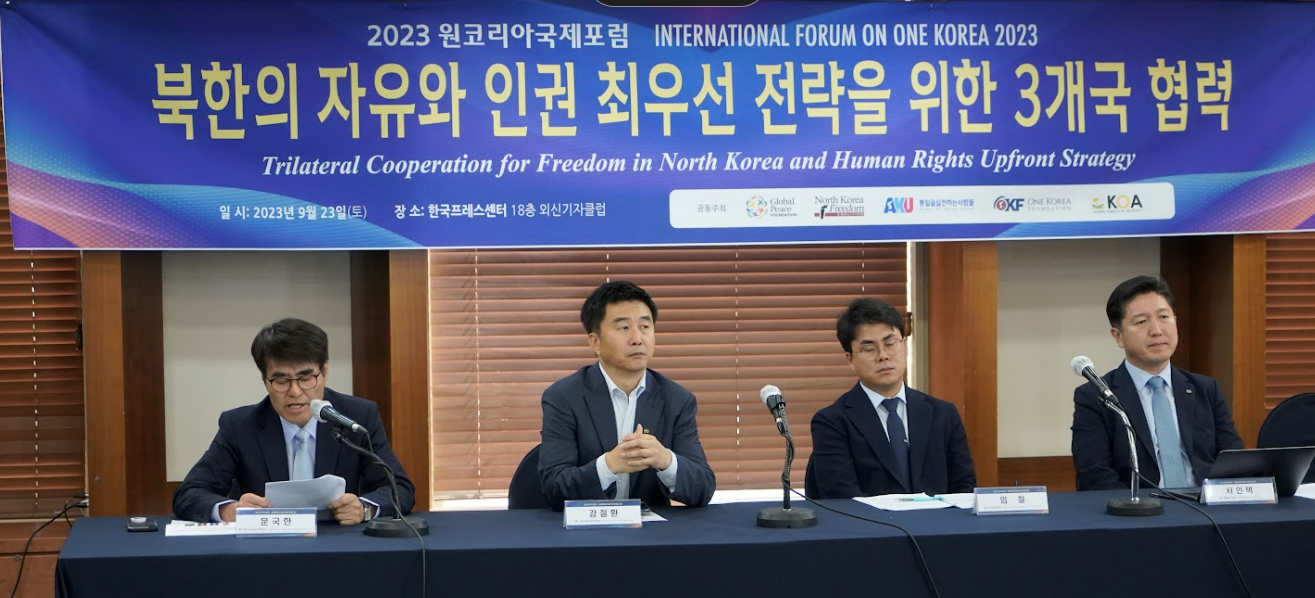
Panelists Kook-han Moon, Cheolhwan Kang, Cheol Lim, and Inteck Seo discuss the importance of coordinated international efforts to bring accountability to the Kim regime.
North Korea’s nuclear program both threatens global security and further impoverishes the North Korean people, noted Kook-han Moon, President of the North Korea Human Rights International Association. Moon quoted a speech by South Korean President Yoon Seok-yeol at the U.S. Congress on April 27, who said, “The North Korean regime is preoccupied with developing nuclear weapons and missiles, [yet] the North Korean people are being thrown into the worst economic hardship and suffering intolerable human rights abuses.”
“There are countless cases of people being mercilessly executed by firing squad for violating COVID-19 quarantine guidelines,” the South Korean president told the Congress, “cases of being publicly executed for watching and disseminating Korean movies and dramas, and cases of people being publicly executed by firing squad simply for possessing a Bible and being religious.”
“Human rights are a moral imperative. However, they are also a national security issue because Kim Jong Un must deny the human rights of the Korean people in the north in order to remain in power.”
“At a time like this,” Moon told the forum, “the most urgent task for free people is the unification of North and South Korea and taking action to improve the human rights of North Koreans. NGOs working for the unification of North and South Korea and improving human rights in North Korea have quietly walked a lonely path. Now is the time to unite those capabilities and take a big step towards the world.”
The Seoul 2025 North-South Unification and North Korean Human Rights NGO World Expo in celebration of the eightieth anniversary of liberation from Japanese occupation in now in planning stages, he said. “This is not just an external and quantitative expo, but rather a historic exposition designed to wipe away the tears of 25 million North Korean residents.”
North Korean realities
Six North Korean escapees shared the realities of life in North Korea, the daily oppression, kidnappings, and deceit that led some Koreans living in Japan to repatriate to North Korea.
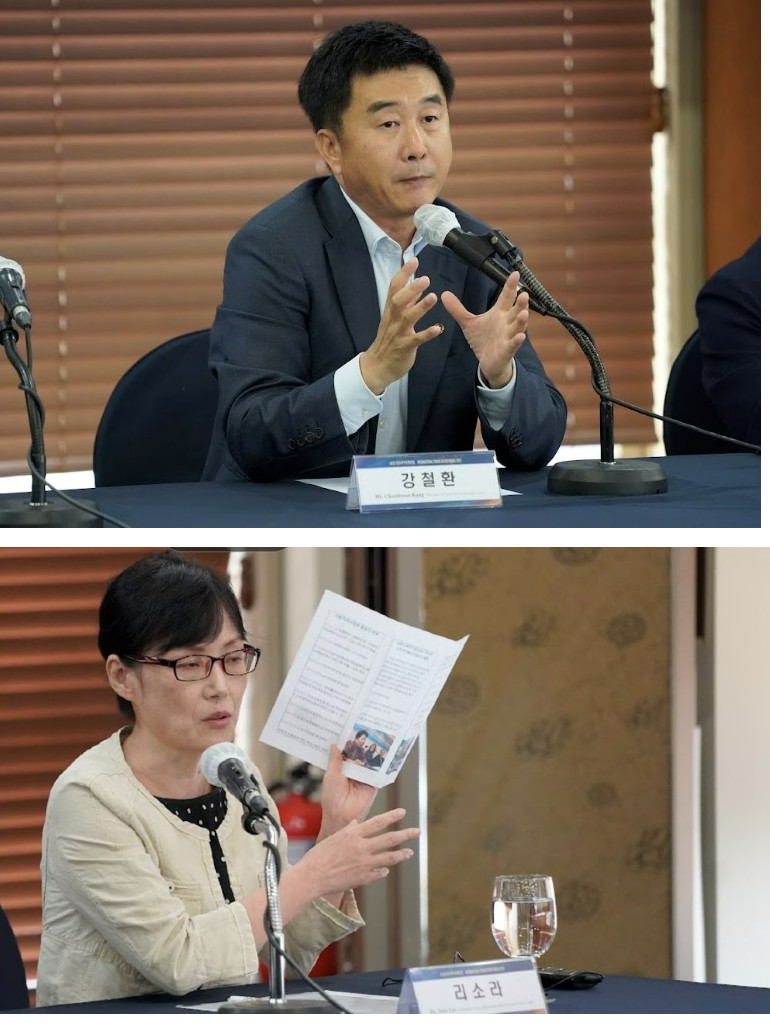
North Korean escapees Cheol-hwan Kang (top) and Sara Lee speak at the forum.
“Approximately 93,340 Koreans living in Japan and their Japanese descendants were deceived by beautiful words such as ‘paradise on earth’ and ‘humanitarianism,’ said Sora Lee, who left Japan for North Korea with her children, expecting a life of freedom and opportunity.
“I walked into North Korea, into hell, and am still in hell at this very moment,” she said. “Our NGO, Korea of All, has been subject to judicial and non-judicial actions from the first day we returned to Japan after surviving the hell of North Korea.”
Sora Lee works for Botonamu-street renewal project in Niigata, a port city in Japan and the departure point of many falsely repatriated to North Korea. Lee also praised another escapee and forum speaker, Eiko Kawasaki, who has worked to hold North Korea accountable through all means and methods, and to make human rights violations committed by North Korea within Japan visible.
Another North Korean escapee, Hyung Sung Lee, expressed concern that the division has separated countless families and hindered freedom, human rights, and democracy in North Korea, is a diminishing concern among South Korean youth.
“I think that the steps taken by our young North Korean defector leaders for human rights, freedom, and unification in North Korea are more important than those of any other young leaders. Growing up in North Korea, we experienced firsthand the oppressive regimes that dominated every aspect of our lives. Lack of basic human rights and freedoms, especially lack of information, was an everyday reality. However, living in the Republic of Korea and the free world, where basic human rights are guaranteed, I have come to realize that change for the people of North Korea is essential and that making that change is our mission on earth.”
“I am confident that young leaders who have defected from North Korea will play a pivotal role in bringing about change in North Korea. We will be the generation that represents and brings freedom, unification, and prosperity to the Korean Peninsula. We have crossed borders, witnessed the world, and tasted freedom. Therefore, we know its importance better than anyone else. Our common desire is to see a free and unified Korean Peninsula where all of our families can live without fear, censorship, and division.
“Our generation has the power to determine the fate of our country and bring about the change we dream of. We must stand together, invest in education, leverage technology, and collaborate with the world to make our vision a reality.”
Learn more about the One Korea Global Campaign.


